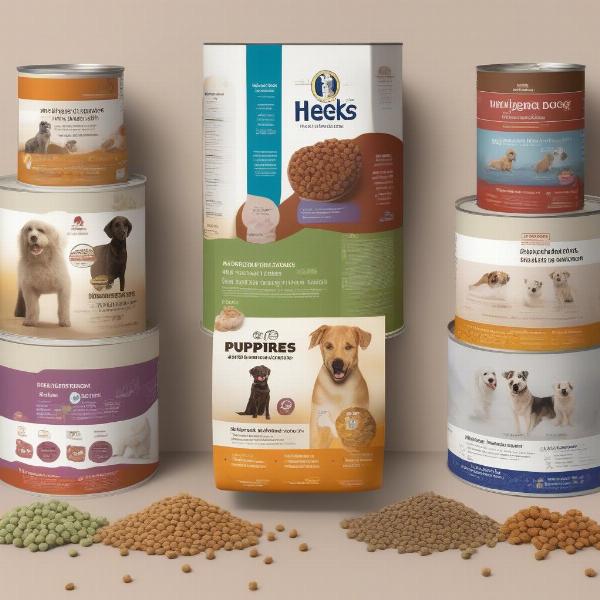Nature’s goodness dog food often promises a healthier, more natural diet for our canine companions. But what does it truly mean, and how can you choose the best option for your furry friend? This guide will explore the world of nature’s goodness dog food, from understanding ingredient lists to debunking common myths. We’ll equip you with the knowledge to make informed decisions about your dog’s nutrition, ensuring they receive the best possible care.
Decoding “Nature’s Goodness”: What Does It Really Mean?
The term “nature’s goodness” evokes images of wholesome, natural ingredients. However, it lacks a standardized definition in the pet food industry. It’s essential to look beyond marketing claims and delve into the actual ingredients. Look for foods with recognizable whole food sources, such as real meat, poultry, fish, fruits, and vegetables. Avoid artificial flavors, colors, and preservatives. Understanding the ingredient list is crucial for determining the true nature’s goodness of any dog food.
Choosing the Right Nature’s Goodness Dog Food for Your Dog
Selecting the right food depends on several factors, including your dog’s age, breed, activity level, and any specific health needs. Puppies require different nutrients than adult dogs, and senior dogs may benefit from specialized formulas. Similarly, active breeds need higher calorie diets than less active ones.
Considering Your Dog’s Life Stage
Puppies need food rich in protein and calcium for growth and development. Adult dogs require a balanced diet to maintain optimal health, while senior dogs often need lower calorie options with added joint support ingredients. Choosing a formula specifically designed for your dog’s life stage ensures they receive the appropriate nutrients.
Addressing Specific Dietary Needs
Some dogs have allergies or sensitivities to certain ingredients, such as grains or specific proteins. If your dog has special dietary requirements, look for limited ingredient diets or formulas designed for sensitive stomachs. Always consult your veterinarian if you’re unsure about the best option for your dog.
 Dog Food for Different Life Stages
Dog Food for Different Life Stages
Debunking Common Myths about Nature’s Goodness Dog Food
Many misconceptions surround nature’s goodness dog food. Some believe that all-natural food is automatically superior, while others worry about the cost.
Myth 1: All-Natural is Always Better
While natural ingredients are generally preferred, it’s crucial to consider the overall nutritional balance. Some commercially prepared diets offer a more complete and balanced nutrient profile than homemade or all-natural options.
Myth 2: Nature’s Goodness Dog Food is Too Expensive
Nature’s goodness dog food comes in a wide range of price points. While some premium brands are more expensive, many affordable options still offer high-quality, natural ingredients.
The Benefits of Feeding Your Dog Nature’s Goodness Dog Food
A diet rich in natural ingredients can offer several benefits for your dog. Improved digestion, healthier skin and coat, and increased energy levels are just a few of the potential advantages. “A balanced, natural diet can significantly improve a dog’s overall well-being,” says Dr. Emily Carter, DVM.
Conclusion
Choosing nature’s goodness dog food involves careful consideration of your dog’s individual needs. By understanding ingredient lists, considering life stage and dietary requirements, and debunking common myths, you can make informed decisions that support your dog’s health and well-being. Selecting the right nature’s goodness dog food is an investment in your dog’s long-term health and happiness.
FAQ
- What is the best nature’s goodness dog food? The best food depends on your dog’s individual needs and preferences. Consult your vet for personalized advice.
- Is grain-free dog food always better? Not necessarily. Some dogs thrive on grain-inclusive diets.
- How can I tell if my dog is allergic to an ingredient? Look for symptoms like itching, digestive issues, and ear infections. Consult your vet for diagnosis and treatment.
- Can I make my own nature’s goodness dog food? Yes, but it’s crucial to ensure nutritional balance. Consult a veterinary nutritionist.
- Are there affordable nature’s goodness dog food options? Yes, many brands offer high-quality natural ingredients at reasonable prices.
- How do I transition my dog to a new food? Gradually introduce the new food over several days, mixing it with their current food.
- What are some common signs of food allergies in dogs? Itching, skin redness, digestive upset, and ear infections are common indicators.
ILM Dog is your trusted resource for all things dog-related. We offer expert advice on dog breeds, health, training, nutrition, grooming, and much more. Whether you’re a new dog owner or a seasoned pro, we’re here to help you provide the best possible care for your furry friend. Learn more about nature’s best dog food and explore a wealth of information on our website. Contact us at [email protected] or +44 20-3965-8624 for personalized guidance.